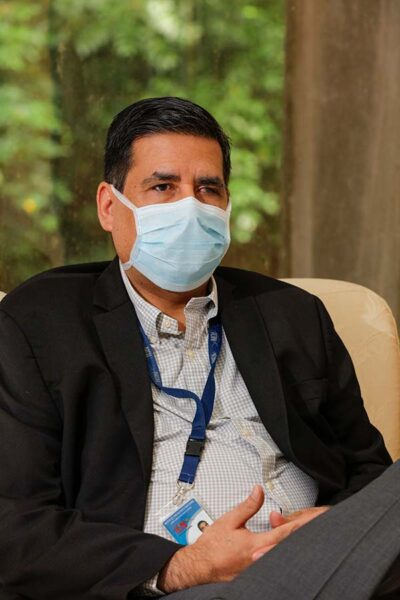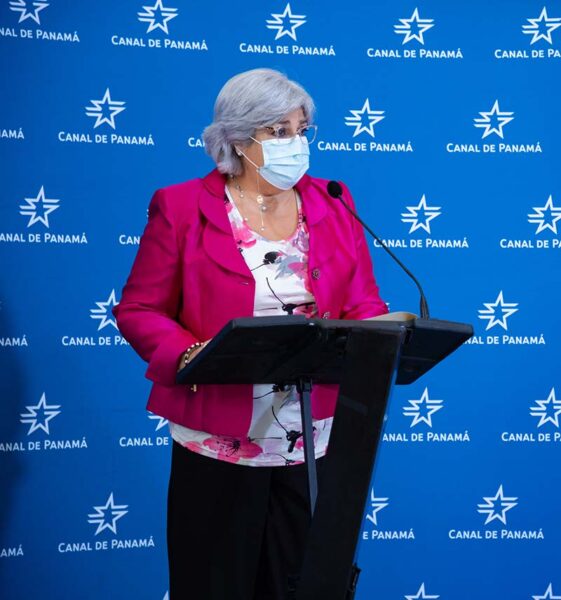The battle against cancer continues
It is 9:15 a.m. and we go to the National Oncology Institute (ION) to interview its director on the occasion […]
It is 9:15 a.m. and we go to the National Oncology Institute (ION) to interview its director on the occasion of breast and prostate cancer prevention month. The entrance to the hospital is packed: people seated and others standing, mariachis are preparing to play some pieces, there are roses in the hands of the ladies, and pink and light blue balloons everywhere.
We are welcomed by Milagros Velásquez, ION’s Public Relations collaborator. Still wearing a mask, her smile is noticeable, and she asks a young woman to take us to the director’s office. While the photographer finishes setting up the equipment, Dr. Juan Alcedo arrives in his office, greets us and we begin the interview.
Cancer, HIV/AIDS and, more recently, Covid-19, are the most reckless diseases that humanity has experienced in recent times. It attacks each victim differently, while science and faith do battle. As far as cancer is concerned, ION is the only center, at the public level, specialized in the management of this disease, although it should be clarified that there are other private entities that also do so.
The harsh reality is that cancer continues to affect women more. The ION indicates that for the year 2020, there were 3,618 new cases, 63.3% were women and 36.7%, men; being people between 50 and 79 years old, the most affected. According to the World Health Organization, cancer of all types kills more than 10 million people annually; that is, it is the second leading cause of death in the world.

Dr. Alcedo, what is cancer?
The definition is complex when framing it as a disease, because breast cancer is not the same as stomach cancer, for example. Even within breast cancer, we have several subtypes that behave differently. What all types of cancer have in common is that the genetic material has undergone an alteration that gives the cells the capacity to duplicate themselves without control when it is not necessary.
Then, these cells gain capacity over the normal ones to survive, and leave the organs where they originated and implant themselves in others. Therefore, if you do not find the disease in its initial stages, you have to deal with the original tumor and, in addition, with its distant manifestations, which is what we call metastasis. The idea of the campaigns is to detect the cancer at an early stage and prevent it from reaching the metastatic stage.
Is the genetic factor the trigger for cancer?
Cancer is a genetic disease because it is the result of damage to the genetic material of a cell. But it is not the same as hereditary. Cancer is not inherited. A damage in the genetic material of a cell of the progenitor is inherited, and over the years, it can develop into cancer. So, it is a genetic damage, but it is not inherited.
There are those who have frequent check-ups and are well, and suddenly an aggressive cancer is detected and they die in a short time… why does this type of cases occur?
Let’s say that this is not the rule of how cancer evolves. Generally, when the disease is detected, it is not because it developed one or two months ago to reach the stage where clinically there is a manifestation. But, certainly, there are tumors that do have that property of gaining advantages over other cells; however, it is not frequent that situations like these occur.
Many women think that to lose a breast is to lose femininity… how can they be helped after the process of total or partial mastectomy?
More than one professional is involved in the management of cancer. That is why the treatment team always includes someone from the mental health field. In addition, there are people in charge of the possibility of reconstructing or rehabilitating the organ that was affected by the surgery.
With regard to prostate cancer, is the blood test as effective as the digital rectal exam?
No. Early detection of prostate cancer cannot be based solely on the blood test (PSA); it must also be complemented by the examination by the urologist. But, at least, let’s say that if the man has the blood test, there is some awareness that he is trying to detect something early, and that is important.
Let’s talk about cancer and Covid-19, how has that interaction been?
When the pandemic started, the authorities determined that ION would not treat patients with Covid-19. That decision was based on the implications of caring for a person with a contagious disease who was surrounded by others whose immune systems were compromised by cancer and its treatments. If a cancer patient was found to have the virus, he or she was transferred to some hospital designated for Covid-19 management, and once the patient recovered, cancer treatment was resumed.
Unfortunately, there were cancer patients who lost the battle when infected with the virus. But it is also true that the positivity of the tests within the group of cancer patients was lower in the national figures, since the patient understood that the disease put him/her at greater risk and took much better care of him/herself. And with respect to the vaccination process, cancer patients were among the first to be vaccinated, and that was very positive for everyone.
Covid-19 caused a worldwide phenomenon, and that is that because of mobility restrictions, some cancer diagnostic services were closed, and that delayed the early detection process. It is expected that this will eventually translate into slightly more advanced stage cancer cases. For example, in 2020, ION received 25% fewer breast cancer cases, however, by the second half of 2021, that number started to increase.
Our interview concludes with Dr. Alcedo’s message to get timely breast and prostate exams, since, early detection can ensure success in the battle against this dreaded disease.

“As a two-time cancer survivor, I know that early detection of cancer is the best defense against the terrible effects of this disease on individuals, their families and the community. The Panama Canal adheres to national and international health campaigns, conducts talks with its employees and facilitates access to testing. The messages in favor of early detection imply that there is an individual responsibility of people that adds to the social responsibility to fight cancer and save lives from the workplace” – Annette Sayavedra de López Vice President of Human Capital.
Treatment depending on the behavior of the cancer:
- Local: Surgery and radiotherapy in the organ where the disease originated. There is no migration of malignant cells.
- Systemic (there is migration of cancer cells): Hormone blocking (if necessary), and chemotherapy. Recently, immunotherapy is used (the immune system is awakened to fight cancer cells).
- Complementary treatments: additional intervention by other professionals for physical rehabilitation, mental health and emotional support.